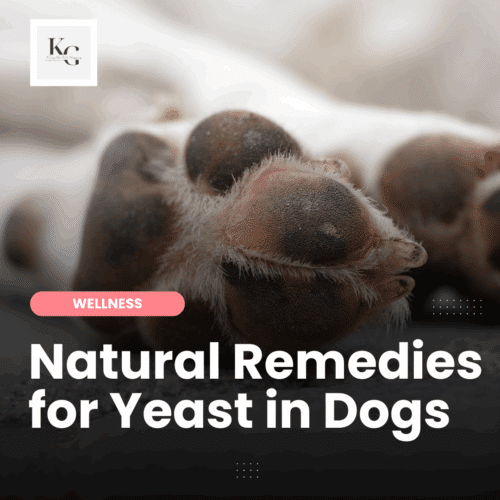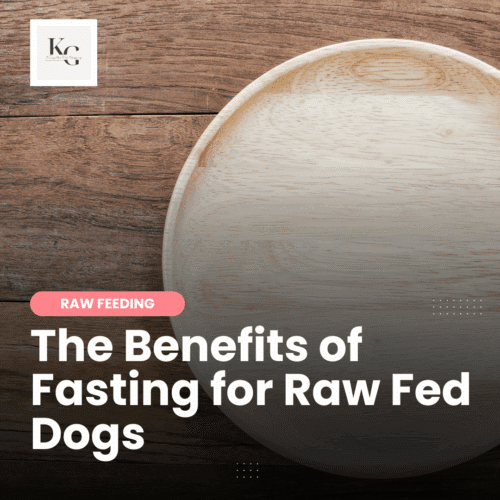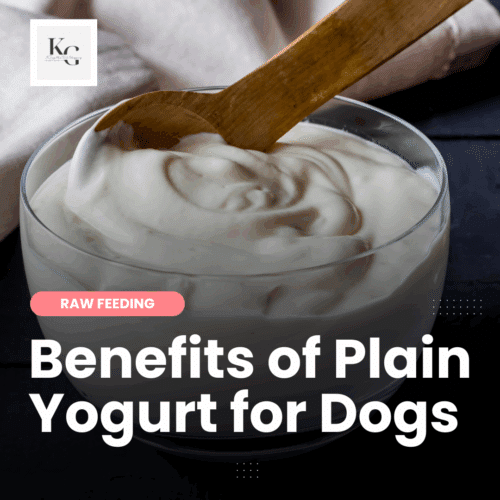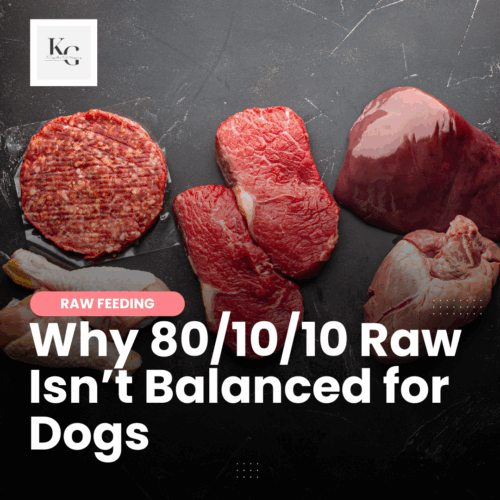Keep the Tail Wagging is supported by pet parents. I occasionally earn a commission (at no additional cost to you) when you click through an affiliate link to one of my favorite products. Thank you for your support. Read More
One of the benefits of feeding raw is the smaller, less smelly poop created by our dogs. According to some dog parents, their raw fed dogs also poop less. I looked forward to this gift from the Raw Feeding Universe, and after four years of feeding my dogs a raw diet, I can tell you that this is the gift that keeps on giving, kind of.
Do Raw Fed Dogs Have Smaller Poop?
Yes and no. Today, all of my dogs have smaller poop, but there was a time when Rodrigo's poop was three times the size of the other dogs because of underlying gut issues. He was diagnosed with exocrine pancreatic insufficiency in 2019, and once I began adding digestive enzymes to his diet, his poop shrunk in size. It's still bigger than everyone else, unlike before the diagnosis.
Do Raw Fed Dogs Have Less Smelly Poop?
Yes! After a while, it's easy to forget that dog poop is less smelly. When Rodrigo's digestive enzymes kicked in, I began to pick up a difference in poop smell. While the other dogs didn't have strong-smelling poop, I could always sniff out Rodrigo's poop in the yard. I can't explain the way his poop smelled, just that I could smell it, sometimes across the property if the wind was right. I knew he was having a rough day when it was that bad.
Now that Rodrigo's gut issues are squared away, I'm happy that ALL of my dogs have less smelly poop.
Do Raw Fed Dogs Poop Less Often?
Today, we have four dogs, and only one was fed kibble in our home, and that was eight years ago. Scout, Zoey, and Apollo were transitioned to raw the day they joined our family. So, I don't know if our dogs poop less often on a raw fed diet.
My four dogs poop once or twice daily, which is normal. Rodrigo probably did poop more on a kibble diet, but I don't know if this is due to the kibble or to his gut health (or maybe both).
However often my pack of dogs poop, I can always count on picking up their poop when we go on walks, so I always carry two poop bags for every dog that I walk. Living with a house full of dogs, it's best to grab a roll of poop bags to be safe.
When We See Food in Raw Feed Poop
Sometimes when I'm cleaning the yard, I see chunks of food (bone pieces, whole vegetables, whole seeds, gristle from raw trachea, rabbit fur) in the poop. I used to think this was evidence that my dogs didn't benefit from this food because it's still whole, but this isn't the case. If seeing these things makes you uncomfortable, I recommend grinding meat, bone, seeds and pureeing vegetables and fruit. With rabbit fur, just don't be surprised and concerned that a coyote got into your yard – it's not scat, it's dog poop, and the fur did its job of clearing out the digestive tract.
When Raw Fed Dogs are Constipated
Whether I'm walking the dogs or cleaning up the yard, picking up poop is the best way for me to tell how each dog is doing. When I see “fresh” poop that is dry and crumbly, then I know that I've added too much bone to their diet. This is easy for me to fix – on their next meal, I make sure to add one of three items:
- a spoonful of organ meat – I mix up a blend and keep a small amount in the fridge for the extra vitamins and to help keep things moving.
- sardines – adding fish or fish oil to the diet can help get things moving, so adding a full or half a can of sardines gets the job done.
- vegetables – I make a veggie mix for my dogs as a source of fiber, antioxidants, and additional nutrients.
While there are other reasons for constipation, including illness, 99% of the time with my dogs, it's diet-related and easily curable.
When Raw Fed Dogs Have Diarrhea
If my dogs have diarrhea or loose stool, then it's usually because of too much rich food (green tripe, organ meat, certain dog treats). After eight years of taking the lead with my dogs' diet, I can quickly identify the issue and make changes to stop their diarrhea.
- Olewo Carrots – this is a dehydrated product derived from carrots grown in an area of Germany (you cannot use local carrots as an alternative) and have a long history of boosting digestive health, skin and coat health, and curing diarrhea.
- plain canned pumpkin – a heaping spoonful of canned pumpkin (we have big dogs) in the meal helps to clear up diarrhea and gas pretty effectively.
While there are other reasons for diarrhea, including illness, 99% of the time with my dogs, it's diet-related and easily curable. Sometimes, if the diarrhea is due to ingestion of something gross, it's a good idea to allow the diarrhea to run its course (as long as it doesn't last longer than a couple of days) to clear out what is irritating the gut. But, in this case, I seek the advice of our veterinarian.
Disclaimer: I am not a veterinarian or a nutritionist. If your dog's poop is signaling a serious health issue, please contact your veterinarian – DO NOT leave a comment asking for a diagnosis. Such comments will not be approved.







That’s so funny. I switched my cat to freeze-dried with a little Ziwipeak and wet food thrown in and he loves it and is doing great!!! So much better.
This is true for cats too, even if we’re on mix diet (wet + raw), not strict raw diet : smaller and less smelly poop. Claire always knows when Pixie has stolen Zorro’s chicken neck, because she poops something that looks like chalk ! Purrs
Standing and applauding. Well said!
My GSD has been raw fed for 8 years and has never been to a vet because she was sick. I now have a new Pomeranian and he too is raw fed and my vet thinks I am nuts. The GSD poops 2 times a day and she weighs 78 lbs, the Pom weighs in at 9.5 lbs and is 5 months old. And yes, I too am a poop checker 🙂 I can tell exactly what my best friends need because of the ” poop check” Feeding raw is a major production, not something dumped in a bowl and these babies are worth it. So, if you are thinking of feeding raw, do your homework and use the best raw food you can get your hands on and study, study, study until you get it right. You will be glad you did !
Not commercial raw diets. There’s no money in studying the benefits of healthy diets for pets or humans, it seems.
“Raw diets for dogs haven’t been around long enough to study and understand their true long term impact” – really? What were they eating prior to domestication?
I switched to raw because kibble was making my dog sick. While I respect the opinion that kibble is superior to raw, my personal experience and the experience of others in the fresh feeding community, including qualified veterinarians, contradicts this opinion.
As I see it, the reason raw is superior to kibble is because it’s fresh food. Kibble is a highly processed food (http://truthaboutpetfood.com/how-many-times-are-ingredients-cooked-in-kibble-pet-foods/) that lacks moisture, has synthetic ingredients, and questionable sourcing. To say that kibble is superior to raw is to say that fast food is superior to eating fresh food for humans (https://keepthetailwagging.com/psychology-today-says-raw-feeding-is-an-eating-disorder/).
The percentages of protein in a raw diet are more than kibble; this is one of the arguments that those in the anti-raw community make all the time; that feeding a high protein diet of raw is dangerous for dogs and you can’t have it both ways; either it’s not enough protein or it’s too much protein.
Raw feeding is more than tossing raw meat into a dog’s dish, as you suggest. I attempt to balance by dog’s diet through variety and feeding percentage of muscle meat, bone, and organ meat. I also add raw eggs, raw goat’s milk, kefir, fermented vegetables, and more to provide adequate nutrients which are tracked in a spreadsheet (http://www.keepthetailwagging.com/nutrients). My dogs get annual blood work to check on their health and I work closely with their veterinarians (who are also pro-raw) on their diet.
While I know that there are going to be people who don’t take the time to do their homework and feed their dogs a balanced diet, I don’t think this is representative of the raw feeding community as a whole. Raw is more than great, it’s species appropriate. It’s kibble that is leading to the decline in our pets’ lifespan and it’s raw (and other natural choices we’re making for our pets) that is turning that around.
There’s a very common misconception that feeding raw causes smaller bowel movements because the dog is absorbing more of the nutrients in the raw food, relative to kibble. While this has some merit, it is not entirely the reason. The reason why the dogs poo is smaller is because fresh raw meat, while being great, is composed of 70-80% water. That said, it’s very simple to understand why a dogs poo is smaller and harder on a raw diet – the dog isn’t eating as much real hard food/meat. High quality kibbles are denser and pack in way more food content without all the moisture. Extract the water from the 1lb of raw you are feeding your dog and you’ll be left with less than 5oz of real food. Raw can actually be a problem here, especially if you aren’t adding the proper supplementation. You can’t just throw 1lb it raw meat product into a dogs dish twice a day and think you’re doing the right thing. Raw diets for dogs haven’t been around long enough to study and understand their true long term impact. Kibble options are so high quality now, that they outperform raw for any dog. The size of the poo, smell and consistency primarily comes from over feeding on a relative basis. I think raw is great, but still not fully understood.
Every dog is different so pooping more often isn’t a bad thing. If you’re looking to make it less hard, you can try adding more organ meat to her diet. If you’re still concerned, I recommend adding a digestive supplement to your dog’s diet; I prefer FullBucket: http://www.keepthetailwagging.com/fullbucket (aff)
I’ve been feeding my coming 4 year old female GSD raw since the day she came home at 9 weeks. She has environment and carbohydrate allergies.
I was so happy to see your post because lately she’s been pooping a lot. It used to be once a day, on her night walk but now it can be 3 or 4 a day. They’re just a a few ‘nuggets’ at a time but to me, that’s a lot more poop! Her poo is usually hard and crumbles into dust. She’s 95+lbs (not fat) and I feed her @ 2.5lbs of food daily – a little under guidelines because she’s not terribly active.
Any (non-vet) advice on how to make her poop less and make it less hard and crumbly? Keeping in mind she can’t eat carbs, pumpkin is out.
Thank You in Advance for any Guidance,
Jeannie C.
my st bernard used to poop 5 to 6 times a day on kibble and they were huge need two bags to pick it up, now its once maybe twice if she has has tripe and a knuckle bone day and only 1 bag per poop
LOL – glad I’m not alone.
Probably the most thorough discussion of dog poop I’ve ever seen.
But yes, food is important. I swear I can tell dogs eating really cheap dog food by the color and enormity of their poop.
I know that technically I am not feeding Blueberry raw (freeze-dried raw doesn’t really qualify as most purists will be quick to point out) – but it is better than kibble. At first I didn’t notice a difference. But she’s been eating this way for more than a few months now and she only poops like once a day now – maybe every other day. You are correct that walks seem to get things moving. In the kibble days – she used to poop up to 3 times during a walk (in an hour and a half – that’s quite a load) plus an additional 1 or 2 more times at home. So the once a day – maximum twice – is pretty sweet! I also have back up bags and back ups to my back up bags as well. You can never be too careful! I once ran out of bags and had to use a Kleenex to carry a pile out on the last leg of our hike (which of course seeped through to my hand a little). After an experience like that – I determined that it would never happen again.